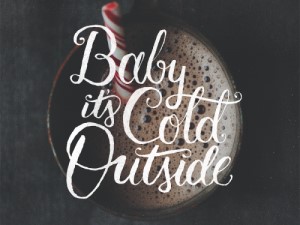Why “Baby It’s Cold Outside” is a Feminist Anthem

December 13, 2017
By Haley Vaughan ’18, Perspectives Editor
One of my favorite Christmas songs of all time is “Baby it’s Cold Outside” written by Frank Loesser. It is a lighthearted, flirtatious winter duet. In fact, it’s not even a Christmas song. There are no references to the holidays whatsoever. As long as it’s snowy and cold this song fits. When you say you love any other Christmas song nobody bats an eye. Walking in a Winter Wonderland? Good. Twelve Days of Christmas? Annoying, but fine. Even Grandma Got Run Over by a Reindeer is accepted. But “Baby it’s Cold Outside” has been branded a date-rape song. The line “say what’s in this drink?” is most often cited as evidence of this theory by those who find the song offensive. I will delve deeper into this point later, but suffice it to say that there is important historical context people do not consider when citing the line.
“Baby it’s Cold Outside” was written in 1944. In the 1940s unmarried “good girls”, did not spend the night at a man’s house. The woman in the song lists off reasons her family would want her to leave: her “mother will start to worry”, her “father will be pacing the floor”, her “sister will be suspicious” and so on. Never once does the woman give a reason she herself doesn’t want to stay. In fact she says “I ought to say, no, no, no, sir. At least I’m gonna say that I tried.” She knows that society would disprove of her decision, but with nobody but her and the her male counterpart present, she is able to act on impulses she would otherwise be told to suppress. Basically she’s saying “whatever. I like this guy, he likes me. Who cares what other people think?”
So what about the other part of the song where the man lists off reason after reason for her not to go? Isn’t he coercing her into staying against her will? No! He is providing her with a list of excuses she can use to explain to her family why she didn’t go home. People criticize this part of the song for focusing too much on the woman’s appearance but he is just engaging in normal romantic language. He clearly likes her and she clearly likes him, otherwise she would not have chosen to stay as late as she did. If a guy I was attracted to told me my “eyes are like starlight” I would swoon just like the woman in the song who confesses she has fallen under his “spell”.
Now onto the hotly debated “drink”. In the era that the song was written in the phrase “what’s in this drink?” was a joke used when a person was doing something they normally wouldn’t. But in this situation, the drink was always very weak or had no alcohol at all. The woman in the song is using the drink as a shield to protect herself from the criticism she knows will come from deciding to go against the norm and stay the night with her romantic interest. Let’s also remember that she was the one who suggested another drink; “Well maybe just a half a drink more.”
The conflict in the song occurs not between the man and the woman but between the society’s expectations and the women’s desires. Her rapport with her romantic interest is coy and flirtatious. In a sense, she is playing hard to get. In the end, the duet, which up until then was a seductive back and forth exchange, ends with the man and woman singing together in harmony for the first time. This symbolizes agreement and consent. “Baby it’s Cold Outside” is a song about a woman doing what she wants to do, not what society expects her to. And what could be more delightfully feminist than that?



Ruth Kramer • Dec 15, 2017 at 8:39 am
Good job Haley!